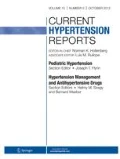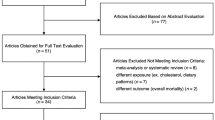Abstract
Purpose of Review
We identified and quantified the results of randomized controlled trials (RCTs) that have assessed the impact of egg consumption on blood pressure in adults.
Recent Findings
We conducted a comprehensive search of medical bibliographic databases up to February 2019 for RCTs investigating the effect of egg consumption on blood pressure in adults. Fifteen RCTs were included with a total of 748 participants. Overall, egg consumption had no significant effect on systolic blood pressure (weighted mean difference (WMD) = 0.046 mmHg; 95% CI − 0.792, 0.884) and diastolic blood pressure (WMD = − 0.603 mmHg; 95% CI − 1.521, 0.315). Subgroup analyses had no effect on pooled results and no heterogeneity was found among included studies.
Summary
Egg consumption has no significant effects on systolic and diastolic blood pressure in adults. Due to several limitations among existing studies, general conclusions cannot be drawn regarding the beneficial or neutral impact of egg consumption on blood pressure in adults.



Similar content being viewed by others
Abbreviations
- CVD:
-
Cardiovascular diseases
- HTN:
-
Hypertension
- CHD:
-
Coronary heart disease
- RR:
-
Relative risk
- RCTs:
-
Randomized controlled trials
- SBP:
-
Systolic blood pressure
- DBP:
-
Diastolic blood pressure
- PRISMA:
-
Preferred reporting items for systematic review and meta-analyses
- PROSPERO:
-
Prospective register of systematic reviews
- WMD:
-
Weighted mean differences
- CAD:
-
Coronary artery disease
- IHD:
-
Ischemic heart disease
- IQW:
-
Ile-Gln-Trp
- LKP:
-
Leu-Lys-Pro
- IRW:
-
Ile-Arg-Trp
- NO:
-
Nitric oxide
- ACE:
-
Angiotensin converting enzyme
References
Papers of particular interest, published recently, have been highlighted as: • Of importance •• Of major importance
Benjamin EJ, Virani SS, Callaway CW, Chamberlain AM, Chang AR, Cheng S, et al. Heart disease and stroke statistics-2018 update: a report from the American Heart Association. Circulation. 2018;137(12):e67–e492.
Hajjar I, Kotchen JM, Kotchen TA. Hypertension: trends in prevalence, incidence, and control. Annu Rev Public Health. 2006;27:465–90.
GBD 2016 Risk Factors Collaborators. Global, regional, and national comparative risk assessment of 84 behavioural, environmental and occupational, and metabolic risks or clusters of risks, 1990–2016: a systematic analysis for the Global Burden of Disease Study 2016. Lancet. 2017;390:1345–422.
Kearney PM, Whelton M, Reynolds K, Muntner P, Whelton PK, He J. Global burden of hypertension: analysis of worldwide data. Lancet. 2005;365:217–23.
Khanna A, Lefkowitz L, White WB. Evaluation of recent fixed-dose combination therapies in the management of hypertension. Curr Opin Nephrol Hypertens. 2008;17:477–83.
Reddy KS, Katan MB. Diet, nutrition and the prevention of hypertension and cardiovascular diseases. Public Health Nutr. 2004;7(1a):167–86.
• Kovacs-Nolan J, Phillips M, Mine Y. Advances in the value of eggs and egg components for human health. J Agric Food Chem. 2005;53:8421–31.
McNamara DJ. The fifty year rehabilitation of the egg. Nutrients. 2015;7:8716–22.
McGuire S. Scientific report of the 2015 Dietary Guidelines Advisory Committee. Washington, DC: US Departments of Agriculture and Health and Human Services, 2015. Adv Nutr. 2016;7:202–4.
Berger S, Raman G, Vishwanathan R, Jacques PF, Johnson EJ. Dietary cholesterol and cardiovascular disease: a systematic review and meta-analysis. Am J Clin Nutr. 2015;102:276–94.
• Alexander DD, Miller PE, Vargas AJ, Weed DL, Cohen SS. Meta-analysis of egg consumption and risk of coronary heart disease and stroke. J Am Coll Nutr. 2016;35:704–16.
•• Zhang Y, Zhang DZ. Red meat, poultry, and egg consumption with the risk of hypertension: a meta-analysis of prospective cohort studies. J Hum Hypertens. 2018;32:507–17.
Ballesteros MN, Valenzuela F, Robles AE, Artalejo E, Aguilar D, Andersen CJ, et al. One egg per day improves inflammation when compared to an oatmeal-based breakfast without increasing other cardiometabolic risk factors in diabetic patients. Nutrients. 2015;7:3449–63.
Blesso CN, Andersen CJ, Barona J, Volk B, Volek JS, Fernandez ML. Effects of carbohydrate restriction and dietary cholesterol provided by eggs on clinical risk factors in metabolic syndrome. J Clin Lipidol. 2013;7:463–71.
Clayton ZS, Scholar KR, Shelechi M, Hernandez LM, Barber AM, Petrisko YJ, et al. Influence of resistance training combined with daily consumption of an egg-based or bagel-based breakfast on risk factors for chronic diseases in healthy untrained individuals. J Am Coll Nutr. 2015;34:113–9.
DiMarco DM, Missimer A, Murillo AG, Lemos BS, Malysheva OV, Caudill MA, et al. Intake of up to 3 eggs/day increases HDL cholesterol and plasma choline while plasma Trimethylamine-N-oxide is unchanged in a healthy population. Lipids. 2017;52:255–63.
Fuller N, Caterson I, Sainsbury A, Denyer G, Fong M, Gerofi J, et al. The effect of a high-egg diet on cardiovascular risk factors in people with type 2 diabetes: the diabetes and egg (DIABEGG) study-a 3-mo randomized controlled trial1-4. Am J Clin Nutr. 2015;101:705–13.
Herron KL, Vega-Lopez S, Conde K, Ramjiganesh T, Roy S, Shachter NS, et al. Pre-menopausal women, classified as hypo- or hyperresponders, do not alter their LDL/HDL ratio following a high dietary cholesterol challenge. J Am Coll Nutr. 2002;21:250–8.
Katz DL, Evans MA, Nawaz H, Njike VY, Chan W, Comerford BP, et al. Egg consumption and endothelial function: a randomized controlled crossover trial. Int J Cardiol. 2005;99:65–70.
Katz DL, Ma Y, Kavak Y, Njike V. Effects of EGG ingestion on endothelial function in adults with coronary artery disease: a randomized, controlled, crossover trial. Am Heart J. 2015;169:162–9.
Lemos BS, Medina-Vera I, Blesso CN, Fernandez ML. Intake of 3 eggs per day when compared to a choline bitartrate supplement, downregulates cholesterol synthesis without changing the LDL/HDL ratio. Nutrients. 2018;24:10(2). https://doi.org/10.3390/nu10020258.
Missimer A, DiMarco DM, Andersen CJ, Murillo AG, Vergara-Jimenez M, Fernandez ML. Consuming two eggs per day, as compared to an oatmeal breakfast, decreases plasma ghrelin while maintaining the LDL/HDL ratio. Nutrients. 2017;29:9(2). https://doi.org/10.3390/nu9020089.
Mutungi G, Ratliff J, Puglisi M, Torres-Gonzalez M, Vaishnav U, Leite JO, et al. Dietary cholesterol from eggs increases plasma HDL cholesterol in overweight men consuming a carbohydrate-restricted diet. J Nutr. 2008;138:272–6.
Njike VY, Ayettey RG, Rajebi H, Treu JA, Katz DL. Egg ingestion in adults with type 2 diabetes: effects on glycemic control, anthropometry, and diet quality-a randomized, controlled, crossover trial. BMJ Open Diabetes Res Care. 2016;4:e000281.
Pearce KL, Clifton PM, Noakes M. Egg consumption as part of an energy-restricted high-protein diet improves blood lipid and blood glucose profiles in individuals with type 2 diabetes. Br J Nutr. 2011;105:584–92.
Putadechakum S, Phanachet P, Pakpeankitwattana V, Klangjareonchai T, Roongpisuthipong C. Effect of daily egg ingestion with thai food on serum lipids in hyperlipidemic adults. ISRN Nutr. 2013;2013:580213.
Sacks F, Marais G, Handysides G, Salazar J, Miller L, Foster J, et al. Lack of an effect of dietary saturated fat and cholesterol on blood pressure in normotensives. Hypertension. 1984;6(2, Part 1):193–8.
Moher D, Liberati A, Tetzlaff J, Altman DG. Preferred reporting items for systematic reviews and meta-analyses: the PRISMA statement. BMJ. 2009;339:b2535.
Higgins JP, Altman DG, Gøtzsche PC, Jüni P, Moher D, Oxman AD, et al. The Cochrane Collaboration’s tool for assessing risk of bias in randomised trials. BMJ. 2011;343:d5928.
Schwingshackl L, Knüppel S, Schwedhelm C, Hoffmann G, Missbach B, Stelmach-Mardas M, et al. Perspective: NutriGrade: a scoring system to assess and judge the meta-evidence of randomized controlled trials and cohort studies in nutrition research. Adv Nutr. 2016;7:994–1004.
DerSimonian R, Laird N. Meta-analysis in clinical trials. Control Clin Trials. 1986;7:177–88.
Higgins JP, Thompson SG, Deeks JJ, Altman DG. Measuring inconsistency in meta-analyses. BMJ. 2003;327:557–60.
Fan J. Local polynomial modelling and its applications: monographs on statistics and applied probability 66. 1st ed. Routledge; 2018.
Egger M, Smith GD, Schneider M, Minder C. Bias in meta-analysis detected by a simple, graphical test. BMJ. 1997;315:629–34.
Iyengar S, Greenhouse JB. Sensitivity analysis and diagnostics. In: Cooper H, Hedges LV, Valentine JC, editors. The handbook of research synthesis and meta-analysis. New York: Russell Sage Foundation; 2009. p. 417–33.
Duggan K, Anderson C, Arnolda L, Boyden A, Cowley D, Dart A, et al. Guide to the management of hypertension 2008-assessing and managing raised blood pressure in adults. 2008;2008:1–34.
Shin JY, Xun P, Nakamura Y, He K. Egg consumption in relation to risk of cardiovascular disease and diabetes: a systematic review and meta-analysis. Am J Clin Nutr. 2013;98:146–59.
Wang MX, Wong CH, Kim JE. Impact of whole egg intake on blood pressure, lipids and lipoproteins in middle-aged and older population: a systematic review and meta-analysis of randomized controlled trials. Nutr Metab Cardiovasc Dis. 2019;29(7):653–64. https://doi.org/10.1016/j.numecd.2019.04.004.
Herron KL, Fernandez ML. Are the current dietary guidelines regarding egg consumption appropriate? J Nutr. 2004;134:187–90.
Majumder K, Chakrabarti S, Morton JS, Panahi S, Kaufman S, Davidge ST, et al. Egg-derived ACE-inhibitory peptides IQW and LKP reduce blood pressure in spontaneously hypertensive rats. J Funct Foods. 2015;13:50–60.
Jahandideh F, Chakrabarti S, Majumder K, Li Q, Panahi S, Morton JS, et al. Egg white protein hydrolysate reduces blood pressure, improves vascular relaxation and modifies aortic angiotensin II receptors expression in spontaneously hypertensive rats. J Funct Foods. 2016;27:667–73.
• Liao W, Fan H, Davidge ST, Wu J. Egg white-derived antihypertensive peptide IRW (Ile-Arg-Trp) reduces blood pressure in spontaneously hypertensive rats via the ACE2/Ang (1-7)/mas receptor axis. Mol Nutr Food Res. 2019;63:e1900063.
Mancia G, Fagard R, Narkiewicz K, Redon J, Zanchetti A, Boehm M, et al. 2013 ESH/ESC guidelines for the management of arterial hypertension: the Task Force for the Management of Arterial Hypertension of the European Society of Hypertension (ESH) and of the European Society of Cardiology (ESC). Blood Press. 2013;22:193–278.
Khan K, Jovanovski E, Ho H, Marques A, Zurbau A, Mejia S, et al. The effect of viscous soluble fiber on blood pressure: a systematic review and meta-analysis of randomized controlled trials. Nutr Metab Cardiovasc Dis. 2018;28:3–13.
Acknowledgments
We thank Iran University of Medical Sciences for providing facilities to search in electronic databases.
Availability of Data and Material
It was registered in the PROSPERO (international prospective register of systematic reviews) database under the number CRD42019127500.
Funding
ZSC is currently supported by NIH T32 DK007135-44.
Author information
Authors and Affiliations
Contributions
RKM screened and selected the trials, extracted the data, and wrote the manuscript. MM screened and selected the trials, extracted the data, and assessed quality of included studies. ZSC reviewed and edited the manuscript. SZS screened the trials. NP screened and selected the trials and assessed quality of included studies. MKS screened the trials. SS conceived the idea, conducted the research, analyzed the data, and performed statistical analysis and had primary responsibility for final content. All authors read and approved the final manuscript.
Corresponding author
Ethics declarations
Conflict of Interest
The authors declare that they have no conflict of interest.
Human and Animal Rights and Informed Consent
This article does not contain any studies with human or animal subjects performed by any of the authors.
Additional information
Publisher’s Note
Springer Nature remains neutral with regard to jurisdictional claims in published maps and institutional affiliations.
This article is part of the Topical Collection on Nutrition and Hypertension
Rights and permissions
About this article
Cite this article
Kolahdouz-Mohammadi, R., Malekahmadi, M., Clayton, Z.S. et al. Effect of Egg Consumption on Blood Pressure: a Systematic Review and Meta-analysis of Randomized Clinical Trials. Curr Hypertens Rep 22, 24 (2020). https://doi.org/10.1007/s11906-020-1029-5
Published:
DOI: https://doi.org/10.1007/s11906-020-1029-5




